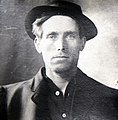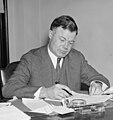Portal:Organized Labour

Introduction

- In trade unions, workers campaign for higher wages, better working conditions and fair treatment from their employers, and through the implementation of labour laws, from their governments. They do this through collective bargaining, sectoral bargaining, and when needed, strike action. In some countries, co-determination gives representatives of workers seats on the board of directors of their employers.
- Political parties representing the interests of workers campaign for labour rights, social security and the welfare state. They are usually called a labour party (in English-speaking countries), a social democratic party (in Germanic and Slavic countries), a socialist party (in Romance countries), or sometimes a workers' party.
- Though historically less prominent, the cooperative movement campaigns to replace capitalist ownership of the economy with worker cooperatives, consumer cooperatives, and other types of cooperative ownership. This is related to the concept of economic democracy.
The labour movement developed as a response to capitalism and the Industrial Revolution of the late 18th and early 19th centuries, at about the same time as socialism. The early goals of the movement were the right to unionise, the right to vote, democracy and the 40-hour week. As these were achieved in many of the advanced economies of western Europe and north America in the early decades of the 20th century, the labour movement expanded to issues of welfare and social insurance, wealth distribution and income distribution, public services like health care and education, social housing and common ownership. (Full article...)
Selected article
The University and College Union (UCU) is a British trade union in further and higher education representing over 120,000 academics and support staff.
UCU is a vertical union representing casualised researchers and teaching staff, "permanent" lecturers and academic related professional services staff. Definitions of all these categories are currently rather ambiguous due to recent changes in fixed term and open-ended contract law. In many universities, casualised academics form the largest category of staff and UCU members. (Full article...)
November in Labor History
Significant dates in labour history.
- November 01 - Malbone Street Wreck occurs on the first day of the BLE strike in 1918 in the U.S.; the first congress of the International Trade Union Confederation is held; the International Harvester strike of 1979–80 began
- November 02 - Brian Behan died
- November 03 - Nathan Feinsinger died; the U.S. Supreme Court decided Marquez v. Screen Actors Guild Inc.; Dennis McDermott was born
- November 04 - Tomasz Arciszewski was born; James Green was born
- November 05 - Eugene V. Debs was born; Nimrod Workman was born; Agustín Tosco died; the 2007 Writers Guild of America strike began
- November 06 - Lloyd McBride died
- November 08 - Ed Boyce was born; the 1892 New Orleans general strike began
- November 09 - Congress of Industrial Organizations founded in the U.S.; Philip Murray died; Danny Greene was born; the Chicago Federation of Labor is founded
- November 11 - Centralia massacre occurs in the U.S.
- November 12 - Bituminous coal strike of 1974 begins in the U.S.; the Democratic Confederation of San Marino Workers is formed
- November 13 - The UK firefighter dispute 2002–03 begins; Karen Silkwood died; the International Typographical Union begins publishing the Green Bay News-Chronicle during a strike
- November 14 - The High Court of Australia issues its ruling in New South Wales v Commonwealth, upholding the validity of WorkChoices; Daniel J. Tobin died; the 2007 German national rail strike began
- November 15 - Federation of Organized Trades and Labor Unions founded in the U.S.; Raymond McKay was born
- November 16 - Jean Maitron died; the Jamaica Association of Local Government Officers is founded; Georges Marchais died
- November 17 - Harold J. Gibbons died
- November 18 - Chris Watson died
- November 19 - William J. McCarthy died; Joe Hill is executed; the National Writers Union is formed
- November 20 - Giles Hart was born; Richard Cordtz died
- November 21 - William Green died; the Columbine Mine massacre occurred in 1927 in the U.S.
- November 22 - David McDonald was born; Philip Murray is elected president of the CIO
- November 23 - Harry Van Arsdale, Jr. died
- November 24 - Charles Millard died
- November 25 - George Mock died; the 2006 Progressive Enterprises dispute begins in New Zealand; Ted Saskin becomes executive director of the NHLPA in 2005
- November 26 - The National Confederation of the Trade-Union Organizations of Ukraine is formed; Nimrod Workman died; Eliot V. Elliott died
- November 27 - Donald Richberg died
- November 28 - The U.S. Supreme Court decides Eastern Associated Coal Corp. v. United Mine Workers of America; André Morell died; William McFetridge was born
- November 29 - John P. Frey died
- November 30 - Mary Harris "Mother" Jones died; the General Federation of Trade Unions of Korea is formed
More Did you know (auto-generated)
- ... that the 2016 Jim Beam strike was the first labor strike in the company's history?
- ... that Russian pianist Pavel Kushnir died on a hunger strike after his arrest for anti-war videos posted on a YouTube channel with five subscribers?
- ... that the execution of Burkinabé trade union leader Soumane Touré was prevented by the intervention of his childhood friend, then-president Thomas Sankara?
- ... that Amazon Labor Union founder Chris Smalls was one of the leaders in the first successful effort to unionize Amazon warehouse workers in the United States?
- ... that the day after returning to Atlanta following his Nobel Peace Prize acceptance in 1964, Martin Luther King Jr. joined picketers who were on strike against Scripto?
- ... that after Kellogg's announced plans to replace striking workers in 2021, members of r/antiwork organized to submit fake applications to the company's hiring system?
Related Portals
Selected image
Selected Quote
It calls me 'Machine' and it cries to me 'Sew!'"
|
— Morris Rosenfeld |
Did you know
- ...that the short-lived Industrial Syndicalist Education League was both the first and the largest syndicalist organisation ever in the United Kingdom?
- ...that Edwin D. Hill was the first president of the International Brotherhood of Electrical Workers to be elected by secret ballot?
- ...that the Lublin 1980 strikes marked the beginning of important socio-political changes in Poland, such as the creation of Solidarity and democratization of the country?
Topics
Get involved
Also see our sister WikiProject, Housing and Tenant Rights!
Associated Wikimedia
The following Wikimedia Foundation sister projects provide more on this subject:
-
Commons
Free media repository -
Wikibooks
Free textbooks and manuals -
Wikidata
Free knowledge base -
Wikinews
Free-content news -
Wikiquote
Collection of quotations -
Wikisource
Free-content library -
Wikiversity
Free learning tools -
Wiktionary
Dictionary and thesaurus
















































































